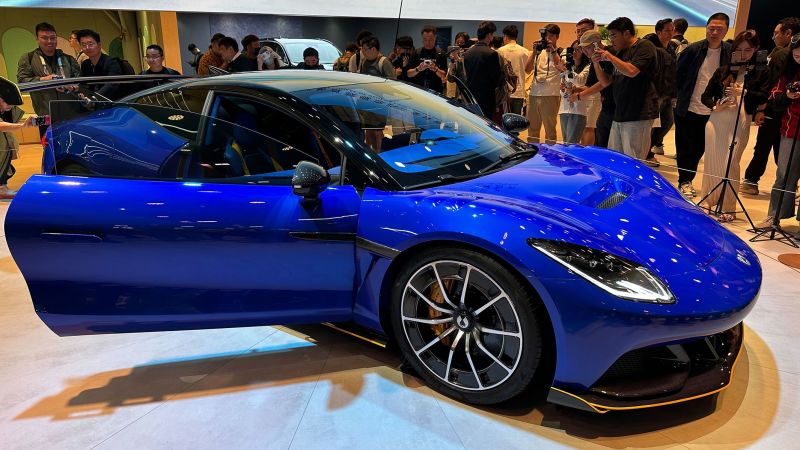Chinese electric vehicle (EV) powerhouse BYD is quickly surpassing well-established competitor Tesla in the realm of electrified vehicle sales, and now, the company has set its sights on competing in the luxury sports car segment. This strategic shift is highlighted by the recent launch of the premium Denza Z model, which was unveiled on Wednesday at Auto Shanghai, China’s largest automobile exhibition. The Denza line aims to position BYD against high-end Western brands like Porsche and Mercedes-Benz, further consolidating BYD’s place in the competitive vehicle landscape.
The launch event at Auto Shanghai showcased a galaxy of local and international carmakers, drawing considerable media attention. The sprawling exhibition center was abuzz with journalists eager to report on the industry’s latest innovations. Among the excitement, BYD’s founder Wang Chuanfu garnered attention as he unveiled the Denza Z, which had been coyly concealed under a black cover prior to its reveal. The innovative model features a striking deep blue design, embodying the company’s ambition to break into a market dominated by luxury brands.
The event illustrates the fierce competition and technological advancements within China’s burgeoning EV sector, which has begun to shock Western competitors with its rapid growth and innovative capacity. As the U.S. automotive industry grapples with the implications of tariffs imposed by President Donald Trump on car imports, China’s EV market has become a focal point, where numerous global brands are reevaluating their strategies to reclaim their prior dominance in the domain, particularly within the largest car market in the world.
By surpassing Tesla in global sales last year, BYD has solidified its leadership position in the Chinese EV market, where the bulk of its sales are concentrated. Tesla, facing challenges in the form of falling revenues—reporting a 9% decline overall and a staggering 20% drop in vehicle sales—has suffered a significant profitability plunge, with net income colliding to a grim 71% drop compared to the previous year. These struggles have allowed BYD to capitalize on an expanding domestic market amid increasing consumer interest in affordable, high-quality electric options.
The anticipation surrounding the Denza Z stems from high expectations set by previous teasers, promising an integration of advanced technology and luxury features. Originally started as a joint venture with Mercedes-Benz over a decade ago, the Denza brand is now wholly owned by BYD, having recently launched in Europe as part of a broader strategy to widen its international footprint.
BYD’s core lineup is known for offering budget-friendly electric and hybrid vehicles, but the Denza brand reflects the company’s efforts to target higher-market segments. Industry analysts highlight that BYD’s aggressive strategy, marked by frequent new model launches and advancements, keeps competitors such as Porsche on alert. For instance, Porsche has struggled in China, acknowledging a drop in sales of 28% in its recent annual report, further exacerbating vulnerability amid a challenging economic environment.
Investigating pricing details for the Denza Z, observers noted the Denza N9 flagship SUV, recently listed at approximately $53,453, drawing a stark comparison with lower-end models like the Song Plus SUV, starting around $18,500. Additionally, BYD’s luxury EV brand, Yangwang, is making strides in the premium market, having just surpassed the symbolic milestone of selling 10,000 vehicles, with its latest U8L SUV model launched during the event.
Despite facing challenges stemming from heavy tariffs imposed on Chinese EV imports by the European Union and the U.S., BYD remains optimistic. The company aims to double its international sales to over 800,000 units by 2025, emphasizing local assembly as a strategy to maintain cost advantages. The first quarter of 2025 already witnessed a robust 60% surge in sales, demonstrating BYD’s increasing market prominence and adaptation to evolving consumer preferences.
Evidence of BYD’s technological leadership can be found in its noteworthy innovations, including launching an advanced driver-assistance system and a revolutionary charging technology purportedly outpacing Tesla’s in speed and efficiency. This competitive edge is ever more critical as rival producers, such as CATL, unveil advancements in battery technology that promise greater vehicle ranges.
BYD’s commanding presence is further reflected in its last year’s earnings report, highlighting $107 billion in sales—which outperformed Tesla’s $97.7 billion. As both companies navigate a shifting market landscape, BYD’s agility and strategic foresight will likely determine its long-term success as the competitive dynamics of electric vehicle production continue to evolve.



